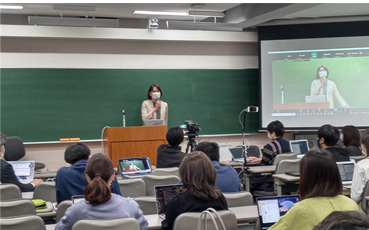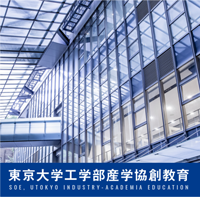Report on the 1st Special Lecture
October 25, 2022
Special Lecture
The workshop for Tech Ambassadors has been expanded as a series of Special Lectures that can be attended and viewed by faculty, staff, current students, and participants in the reskilling courses. In the first session, Ms. Reiko Kojima, Director of Marui Corporation, gave a lecture on "What is 'Well-being Management'?
Content of Lecture
Lecture: Reiko Kojima, Director, CWO (Chief Well-being Officer), Marui Corporation.
Tittle: What is "Well-Being Management" ? ~Considered from the perspective of corporate D&I initiatives~
I have been an industrial physician for about 20 years at several companies with a desire to become a doctor who supports workers, and I have been a Director and Chief Well-being Officer of Marui Group since 2021. Well-being is a keyword that encompasses today's theme, D&I (Diversity & Inclusion).
The word "well-being" was originally defined in the WHO Charter, which entered into force in 1948, as "health is a state of complete physical, mental and social well-being and not merely the absence of disease or infirmity.” The original English word "well-being" is used here. That is why a physician is our Chief Well-Being Officer. And management that aims for a society where everyone can be well through corporate activities is called well-being management.
Marui Group was the first company to offer credit cards in Japan. In the prewar era, when Japan was still poor, we were the first to create a system of credit sales, monthly installments, and installment payments that allowed everyone, not just the wealthy, to get what they wanted. In the words of our founder, "Credit is not something we give to our customers (credit), but something we create together with them," and "creating together (co-creation)" is the underlying value of the Marui Group.
To date, we have created numerous products, applications, and other services together with our customers. If each and every employee works with a sense of "being made to do," we will not be able to realize the values of "co-creation" through our business in society. That is why we clearly stated in our corporate philosophy in 2007, “We will continue to evolve to be of service to our customers,” and “Growth of people = growth of the company.” And over the past 10 years, we have promoted a culture of hand-raising, in which employees and management thoroughly engage in dialogue and think and act on their own initiative. We are also reforming the way we work. For example, an average worker's monthly overtime at a typical company is roughly 30 to 40 hours, but at Marui Group, the average monthly overtime is 3 to 4 hours.
Today, I would like to introduce D&I's efforts to create an organization where employees can play an active role regardless of gender, which is known as D&I's first and foremost priority. The Marui Group has approximately 40% female employees, but at the start of the initiatives in 2013, the percentage of women in management positions was as low as 7% when broken down by job level.
We therefore focused on four initiatives, the first of which was an Unconscious Bias Program for managers. Unconscious bias is a bias in one's viewpoint that one is not aware of. If left unchecked, it can make it difficult for people to work and create communication problems in the workplace. We are especially helping managers recognize their own unconscious bias and utilize it to change their behavior by, for example, asking them about upcoming jobs rather than simply assuming that women with children cannot go on business trips.
The second program is a career design program for women around the age of 28, who are facing a turning point in their lives, such as marriage or childbirth. The program is not about giving up time at home because of work, but about what kind of life they want to lead. Through discussions with female executives and senior employees, this workshop encourages participants to stop and think about the kind of life they want to lead in the future.
The third is leadership training. When we looked deeper into the reasons behind women's low aspirations for management positions, we found that there are thoughts such as "managers need to be strong," "if I can do what I like, I don't need a promotion," "I am motivated but lack confidence," and "it seems too much work”. This workshop includes panel talks, dialogues, and honest discussions about what actual female managers think and the interesting aspects of the world that can only be seen by becoming a leader. In the beginning, the workshop was only for women, but now it is open to both men and women.
The fourth is a special effort we are making to encourage men to take paternity leave. We enforced a simple rule that when a subordinate reports the birth of a child, the supervisor always asks when he will take parental leave after offering his or her congratulations. Now it is commonplace for men to take childcare leave as well, and the percentage of men taking childcare leave has reached 100% for four consecutive years.
Through these four measures, the number of people who "really agree" with the idea that “people should be active regardless of gender” has risen to 99%, and the number of people who understand this has risen to 62%. Women's orientation toward higher-level positions rose by nearly 30%. What about the percentage of women in management positions? 7% rose to 14%, but we have not yet reached our goal of 15%. I believe that the next bottleneck that needs to be eliminated is the deeply-rooted gender role division consciousness (the ideas that divide roles stereotypically on the basis of gender) that exists in society.
People suffer from being pushed around on the basis of gender and are unable to demonstrate their true potential. If there are people who lack well-being because of this, and who cannot work or live in a fulfilling way, we want to change that. We look properly at the person's own good qualities, not their attributes. I would like to work with everyone to create a well-being society in which each individual is recognized as an individual, free from stereotypes and prejudice against attributes. As a company, Marui Group is seriously committed to this goal.
Together, we will create an inclusive and prosperous society where all people can feel happiness. I hope that today's talk will encourage everyone to think about well-being and D&I.
Event Report
The Tech Ambassadors Plenary Meeting has now become a series of Special Lectures, which are open to all students, faculty, and staff on campus, as well as students who have taken the Metaverse School of Engineering Reskilling Courses online. The first lecture was given by Ms. Reiko Kojima, Director of Marui Corporation.
There were 18 participants on-site and 64 participants online. Despite the small number of participants, the time was full of intense interactions, with the lecturer, Ms. Kojima, asking inviting questions, and the participants asking enthusiastic questions. The Q&A session was so successful that the originally scheduled group discussion was skipped and the plenary discussion was held until the very end of the session.

Lecture
The abstract of the lecture is as follows, but both in the on-site discussion and in the questionnaire survey conducted afterward, the following comments were made: "I have learned that individual well-being is an important element for sound management and corporate growth;" "It is wonderful that the company achieved results, not just idealism;" "I would like to hear more concrete examples;” and “I was surprised to see how much more women's careers and men's use of paternity leave could be expanded by such a change in corporate awareness (make supervisors always ask when the male employees will take parental leave after offering his or her congratulations to encourage male employees to take childcare leave)."
I was impressed by the background of recent corporate efforts to address ESG and sustainability, and the detailed measures and innovations that have been taken to steadily bring about change.
(Written by Akiko Kumada, Assistant Dean of the Graduate School)
Contact us
METAVERSE SCHOOL OF ENGINEERING




